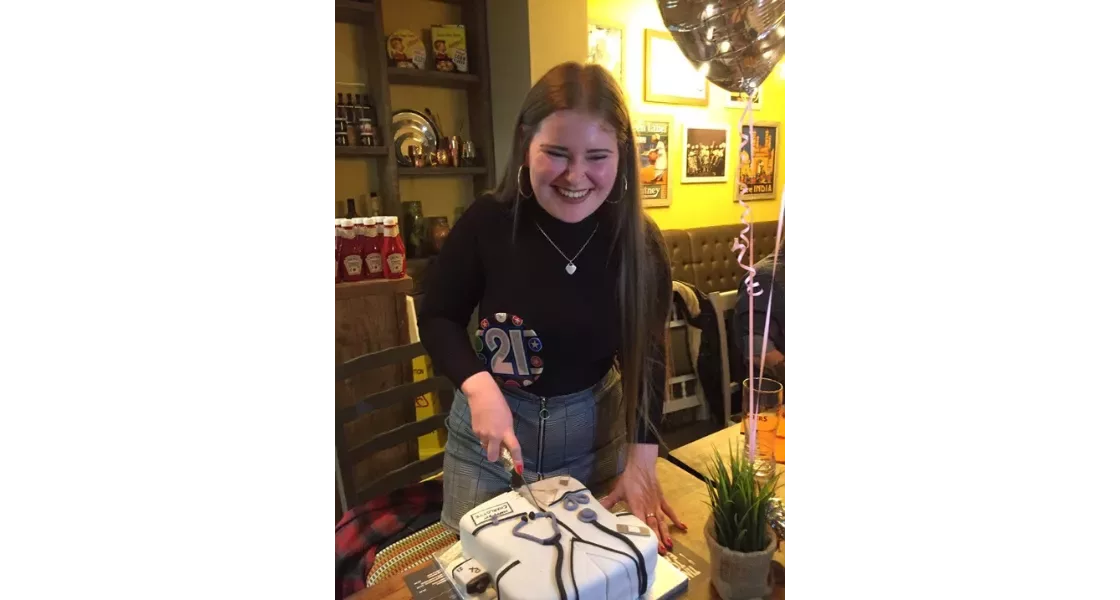Could you tell us a bit about how you first came across your symptoms?
I was 20 when I first noticed my symptoms. I had experienced nipple discharge once or twice before and had ignored it, however I paid closer attention when my mum pointed out that she was noticing discharge on my clothes.
We agreed that I would monitor it for a few weeks, and if it continued, I would contact my GP at my university and discuss the issue. The discharge continued so I made an appointment. When I finally saw the doctor, they were able to see and produce discharge. They were unsure of the cause, so made a two-week cancer diagnosis referral to the local breast screening unit. When I attended the appointment at the unit, the consultant was very sharp and felt almost judgemental. She could not produce any discharge like the first doctor, and told me to go home as there was no issue. She told me she would send a follow up for a month’s time to see if the discharge had continued.
At the follow up appointment, she managed to produce discharge and at that point told me she would make an appointment for exploratory surgery to see if it was anything unusual. The surgery showed no concerns and I was discharged very quickly.
What happened after this initial experience?
A year later when I was 21, I noticed a lump in my breast. I put off going to see my GP again as I was nervous that my symptoms would be ignored and that perhaps it was just scar tissue from my exploratory surgery. I waited 6-9 months, but my lump hadn’t gone and I knew I needed to go back. I was adamant I wanted to go back to the doctor, but I was nervous they were going to turn me down again for wasting their time.
I finally plucked up the courage to go back to my GP and she was much more concerned this time. She referred me to the breast screening unit who felt the lump straight away and insisted this time that I should have biopsies and an ultrasound to see if there was anything of concern. Two weeks after my biopsy, after a short holiday with my friends, I returned to the unit with my mum and was told that I had breast cancer. I was incredibly shocked by all of this news and felt betrayed and let down by the consultant that she had not taken me seriously when I first visited.
That must have been a huge shock. Were you aware that breast cancer can affect young people?
I naively assumed that I was too young to be diagnosed with breast cancer. I assumed that my symptoms were due to a hormonal change associated with contraception or because of some medication I was taking. No one else in my family has had breast cancer and I have found out that I don’t carry the BRCA gene after having some genetic testing. I was aware of breast cancer after seeing campaigns on daytime TV and on changing room posters, but I hadn’t brought it to the front of my mind until I saw my nipple discharge. I didn’t think breast cancer was something I could get under 50, and I’d never checked my chest.
How has your experience changed your relationship with your body?
I’ve had a rollercoaster of a relationship with my body. Before being diagnosed, I’d been on diets, and felt happy with my body. However when I was diagnosed, I felt like my lovely new body had betrayed me a bit. All the treatment had such a physical impact on my body, so I just focussed on getting better. All I could see were my scars which made me feel like I was looking at someone else’s body in the mirror, so I got in touch with an old school friend who offered to do a cartoon illustration of my new boob. It made me look at my body in a new way, giving me a third-person perspective. I came to terms with how my body is different and how it is healthier than it was before. I can now accept the minor changes and I’m grateful to my body that it’s going to carry me through to the future.
Has this experience impacted you in any other ways?
When I was diagnosed, I was three months away from finishing studying nursing at university, but I was told it would be strongly advised that I move home and suspend my studies whilst I received treatment. My university were brilliant, allowing me to pause my course and come back when I wanted. I have now finished my treatment and have since finished my degree! I feel that my experience has really influenced the area of nursing I would like to go into and has given me a more ‘live for the moment’ and ‘don’t waste any time’ mindset.
I do feel like my experience has had a very big negative impact on my mental health, and this is something that I haven’t yet addressed. I would advise anyone going through a similar experience to accept help from those who are offering and try not to feel like a burden. You do not need to put on a front for other people and they will understand if you’re struggling – it is an incredibly challenging experience.
What would be your advice to someone else?
My advice would be to be persistent and believe that what you are feeling is justified. At my first appointment I was so concerned and worried and was made to think that I was wasting their time. It’s horrible to think that way about your own health. Everyone should be allowed to feel like their experience is valid.
